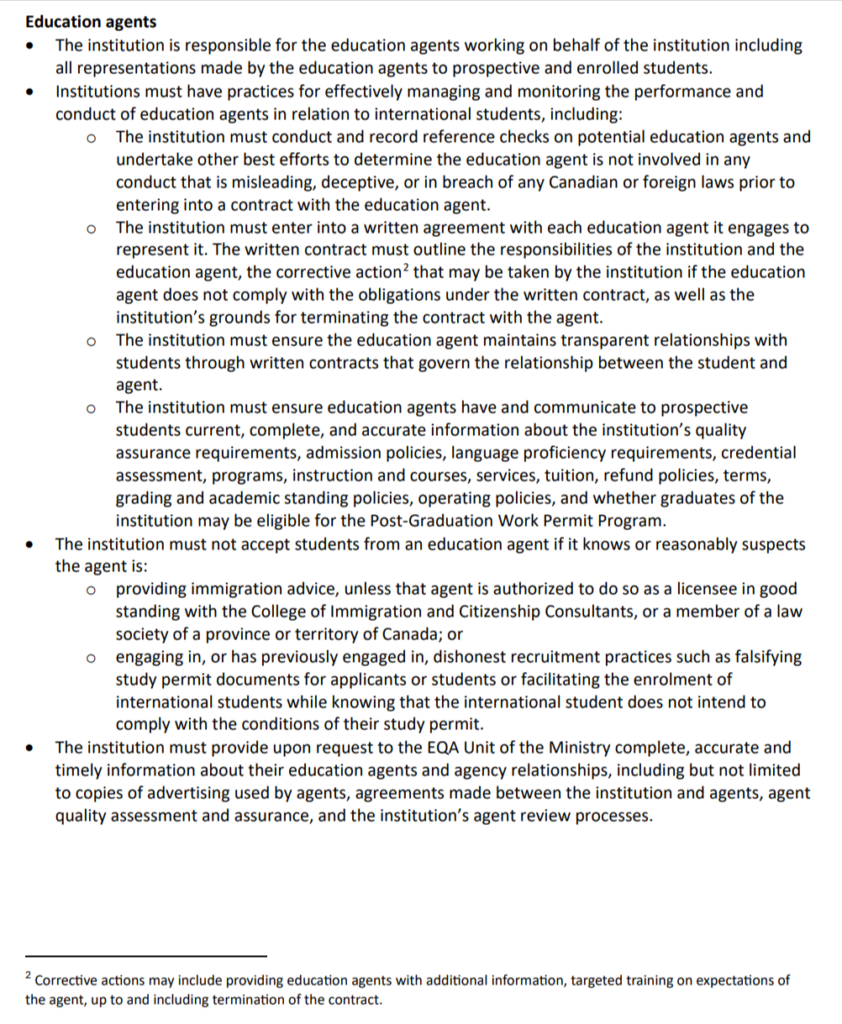British Columbia has initiated phase two of its International Education Framework to “strengthen student supports and ensure a high-quality education for international students through higher standards and stricter requirements for institutions that enroll international students.”
The move follows the roll out of phase 1 in January 2024, which included:
- a moratorium on new institutions seeking to host international students until February 2026
- higher standards for approval of new private degree programs
- strengthened standards, inspection and enforcement for private training institutions, and
- tuition transparency for international students at public post-secondary institutions.
The centerpiece of the phase two measures, which were announced by BC’s Ministry of Post-Secondary Education and Future Skills on 16 July 2024, is a new Education Quality Assurance Code of Practice. From 1 January 2025, all institutions wishing to host international students will be required to verify they meet the standards set out in the Code.
The Code sets out obligations on institutions across a range of areas, including marketing and promotion, offer and enrollment, student support and welfare, and post graduate employment information. It also imposes substantial new requirements regarding how institutions work with education agents which are worth considering in detail.
Purpose and definition
Setting standards for the interaction between institutions and education agents is identified as one of the three purposes of the Code.

An ‘education agent’ is defined in the footnote as follows:
Education agents can be individuals or organizations located in Canada or abroad offering marketing, promotion, recruitment and other services in the education sector. Education agents are known by various titles such as student advisors, education consultants, counsellors or representatives, and include subcontracted agents. (emphasis added)
The definition is broad, and will capture a wide range of relationships and services related to student recruitment. The inclusion of ‘subcontracted agents’ is significant because it seems to quite deliberately extend the obligations in the Code to the armies of sub-agents recruited by education agent aggregators. More on that later.
What are the new requirements for institutions?
Under the heading ‘Standards of Conduct – Institution Requirements’ sits a sub-heading – ‘Education agents’ – with the following content:

The obligations imposed on BC institutions are similar to those found in regulatory and self-regulatory regimes in other markets, for example Australia’s National Code of Practice for Providers of Education and Training to Overseas Students, the UK’s Agent Quality Framework, and Manitoba’s Code of Practice and Conduct Regulation. Like those other regimes, there is a question about how the obligations should be applied to sub-agents.
The inclusion of ‘sub contracted agents’ in the definition of ‘education agent’ has significant compliance implications for BC institutions who, on a common sense reading of the document, will have to acquit the Code obligations for each of the sub-agents of any education agent aggregator they work with. Realistically, it seems impossible for them to do that in any meaningful way. At last count ApplyBoard – which is the dominant agent aggregator in the Canadian market – had 6,500 ‘recruitment partners’ (i.e. sub agents). Will a BC institution working with ApplyBoard ‘conduct and record reference checks’ on each one? The compliance task with respect to sub-agents becomes even more unrealistic if a BC institution works with more than one of the agent aggregators represented in the chart below, which shows the number of sub-agents claimed by the main education agent aggregators. Further, the idea that an institution will ‘enter into a written agreement’ with ‘sub-contracted agents’ (per the definition) is paradoxical and undermines the whole concept of the education agent aggregator business model.
Sub-agent networks – Jan 2025 by GeoffRegulatory reality
So what’s the likely regulatory outcome here? A strict reading and application of the obligations in the Code with respect to sub-agents would make it almost impossible for a BC institution to work with an education agent aggregator, particularly noting the potentially serious consequences of non-compliance with the new Code (see below). However, a ‘no aggregators’ outcome in BC would be extreme and seems unlikely. Much more likely is that the Ministry will end up exercising some discretion in how the Code is applied in practice with respect to the relationship between BC institutions and aggregators. Time will tell on the regulatory approach, but one thing seems clear: in relation to working with education agent aggregators and responsibility for the conduct of their sub-agent armies, the new Code will at a minimum raise the bar well above reliance by an institution solely on the assurances by aggregators that their sub-agents are ‘trusted’, ‘vetted’ or ‘screened’.
Related posts:
- Into Temptation: the rise of education agent aggregators and sub-agent risk
- 5 questions to ask an education agent aggregator about their sub-agents
What’s the stick?
The Education Quality Assurance (EQA) designation is available to public and private post-secondary institutions in British Columbia that meet or exceed institutional quality assurance standards set by the province. Failure to comply with the Code may result in revocation of an institution’s EQA designation. As explained above, from 1 January 2025 all institutions wishing to host international students will be required to verify they meet the standards set out in the Code.

Importantly, the Code makes it clear that education agent misconduct can result in revocation of EQA designation. This raises the stakes significantly for BC institutions in the way they work with educations agents and education agent aggregators leading small armies of sub-agents.
Working with education education agents?
AgentBee’s education agent due diligence solution supports educational institutions to implement best practice education agent due diligence processes.
Educational institutions can use it to:
- protect students – conduct initial and ongoing due diligence checks on education agents.
- protect your brand – detect cases of unauthorised agents using your institution’s name, logo or other IP without permission.
Our clients include…
Get new posts…
Follow AgentBee on Linkedin to get our latest posts on education agents as they drop – (click the icon below)


